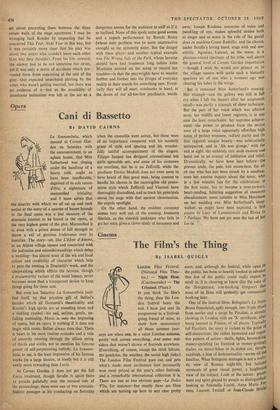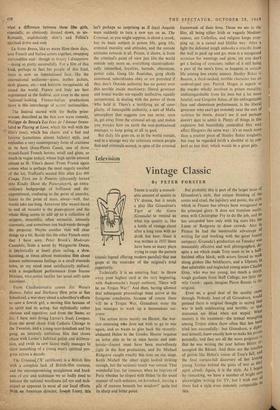politics. It may be that his own political informa- tion
is far greater than he thinks worth impart- ing, but occasionally he makes us wonder : is he remarkable collection of papers? Sentences like his categorisation of the mourners at his subject's funeral make us suspect the latter. 'Two of the pall-bearers represented the Old Order from
coffin was borne by the new men who had taken over — Churchill, Birkenhead, Stanley Baldwin and Ramsay Macdonald.' At times, also, his desire for dramatic effect gets the better of him.
Peace at last? Peace on Chanak? Peace in the Cabinet? It certainly seemed like it. Curzon
But this is exceptignal. For the most part he gives the impression of knowing his background intimately and of using his material with con- siderable skill.
Yet his central view of Curzon seems to me to be mistaken. He believes that Curzon failed
because he was an anachronism, because he was stranded on the shore of democratic politics like some vast whale left by the receding tide of
aristocratic influence; and he sees him as the last example of a line of political grandees. But this was not the essence of Curzon. Anecdotally. he
16estkr
THE LOTUS & THE ROBOT
16estkr
THE LOTUS & THE ROBOT `Brilliantly summarises the consequences of the split between Eastern & Western thought'.
J. W. LAMBERT The Bookman MONDAY 25s.
il4,4ce.■44644 .1 Ar Aor Air A AV As AV Ali
Leger, Zadkine, Picasso, yield a critique far more subtle and inclusive than any crude doctrine of Social Realism, and it is one which is much nearer to the common experience of modern art. However, it is not in the end satisfying. Whether this is because his arguments have had to be crammed into the confined space of a weekly column or whether the argument is itself over- simple I cannot be sure. The fact is that there is too much here of hindsight, of knowing what the answer is supposed to be before doing the sum, a sort of critical cribbing. I remarked above on Berger's talent for rationalising ,and making intelligible his experience in front of works of art. For example, he is able to tell the story of looking at a Matisse sculpture as though he were recounting a particularly vivid dream: the Physical exploration of the form, the incidents and surprises, rounding a corner or looking back over the ground covered, the recollections, the fantasies, the adventures on the way. But these descriptions, marvellous though they are as parables of art appreciation, are still the product of the literary imagination. They don't bring one closer to the work, although one comes very close indeed to the man writing up a story and calcu- lating his effects so as to bring himself and his readers to a predetermined point. The experience itself is not treated objectively; it is rationalised prematurely to give it a dramatic structure.
This book is a milestone in Berger's search for a real resting point in his internal tug-of-war. Already one longs to follow him on the next stage, particularly if he will allow himself a more extended examination of the artists who are nearest to him. There are few enough people writing about art who are prepared to shoulder his sort of load.
ANDREW FORGE
maimmigaginummi MURIEL SPARK
THE BACHELORS
Evelyn Waugh
(1 aril dazzled by The Bachelors. It is the cleverest and ons elegant of all Miss Spark's clever and elegant book.'
John Davenport (Observer)
'In essence this is a profoundly serious novel about the human condition as revealed in the lives of some London bachelors. Miss Spark is an artist, and puts us all in her debt.'
Paul Scott (Books and Bookmen)
'Miss Spark has done more outstanding work in a short space of time than and living writer.'
Walter Allen (New Statesman) Her admirably elegant comic art.' David Holloway (Daily Telegraph) 'Her ear for dialogue is superb.'
MACMILLAN 16s
IZINGIMMIUMEMI What Mad Universe
Don't Tell Alfred. By Nancy Mitford. (Hamish Hamilton, I5s.) UNLIKE much science fiction, this story has no discernible moral or satirical purpose, and its highly original brand of anti-comedy—the use of situations and characters that bear all the marks of the comic except that of inducing laughter—will prove too subtle for some tastes. A few, indeed. may miss the point of Don't Tell Alfred so thoroughly as to conclude that they are reading nothing more than a bit of upper- class chinwag about embassy life in Paris and the opportunities there offered for the pursuit of whim. The least familiarity, however, with such H. G. Wells classics as 'The Plattner Story,' not to mention modern equivalents like Fredric Brown's What Mad Universe, suffices to establish that what we have here belongs to a well- established sub-category of the genre, that which replaces the more customary leap into the future with a sidestep into a parallel time-path, or alternate probability. Miss Mitford has under- taken to explore one of the infinite number of worlds co-existent with our own.
OF
TILE ROMAN EMPIRE
A one volume abridgement by D. M. LOW
SIR HAROLD NICOLSON : 'Nothing important is omitted . . . con- tinuity is maintained by excellent running commentaries. . . . What pleasure can be derived from the wealth of this ingenious abridge- ment! I congratulate Mr Low on a scholarly and provocative task, accomplished with taste and knowledge.'
THE DECLINE AND FALL















































 Previous page
Previous page